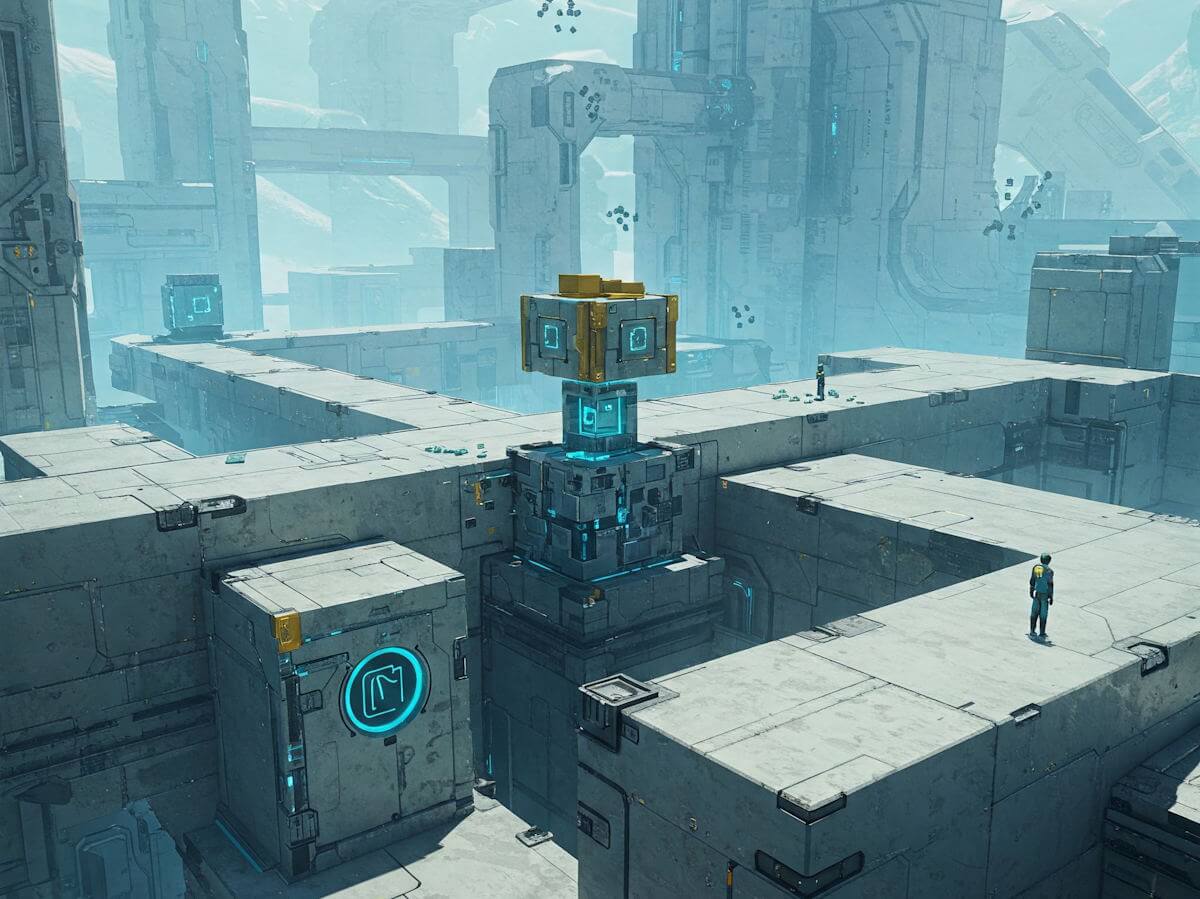The Talos Principle II is a thought-provoking philosophical puzzle game that builds upon the foundation established by its predecessor. Developed by Croteam, this sequel invites players to engage with an intricate world filled with complex puzzles designed to challenge both the mind and the spirit. At its core, the game explores profound existential questions, inviting players to ponder the nature of existence, consciousness, and what it means to be human.
The premise revolves around the notion that players find themselves in a world where they must grapple with their identity as a sentient being. As they solve puzzles, they encounter a series of scripted dialogues and narrative elements that serve to deepen the philosophical inquiry at hand. The introduction of new characters and additional layers of complexity in the puzzle mechanics further enhance the gameplay, allowing for a richer exploration of the philosophical concepts introduced in the original title.
Overall, The Talos Principle II expands the philosophical framework of its predecessor while maintaining a commitment to challenging gameplay. Through its unique blend of puzzles and thought-provoking themes, this game stands as a significant entry into the realm of interactive storytelling and philosophical inquiry, setting the stage for an immersive exploration of what it means to exist in a world that might be as artificial as it is real.
Philosophical Themes Explored
The Talos Principle II is not merely a puzzle game; it serves as a profound exploration of various philosophical themes that challenge players to confront their beliefs about existence and the essence of being. One of the central themes in the game is consciousness. Players are prompted to question the nature of self-awareness through the interactions with advanced artificial intelligence. The game constructs a narrative that invites players to ponder what it means to be conscious—whether it is a product of biological processes or could be replicated in a synthetic form.
Another significant theme is free will. The game intricately weaves scenarios that make players confront the extent of their autonomy within the constraints of predetermined pathways. As players solve intricate puzzles, they come to realize that every action, while appearing to be a choice, is often influenced by the limitations set within the game environment. This juxtaposition provokes contemplation about whether human decision-making is genuinely free or if it is predetermined by external factors, be they environmental, social, or even biological.
The nature of reality is also a critical focus in The Talos Principle II. The game presents a richly layered world that mirrors philosophical skepticism about what is real versus what is illusory. Through interactive elements, players are led to question their perception of reality and the grounds upon which they base their beliefs. This theme is complemented by the exploration of ethics in artificial intelligence; as players engage with AI characters, they must grapple with moral dilemmas concerning the treatment of sentient beings, even if they are not human.
These thematic elements are not merely thematic embellishments; they are foundational to the gameplay and narrative structure, creating a reflective space for players. The Talos Principle II successfully integrates these profound philosophical inquiries, enhancing the gaming experience by engaging players in critical thought about some of humanity’s most profound questions.
Gameplay Mechanics and Their Symbolism
The Talos Principle II employs a variety of gameplay mechanics centered around intricate puzzles that challenge players’ problem-solving skills. At the core of these mechanics lies the central concept of player choice, which is manifested through various puzzle-solving approaches. Players are often presented with multiple solutions to a single problem, demonstrating the philosophical importance of individual agency and the implications of their decisions within the game’s narrative framework.
One notable mechanic is the use of environmental manipulation. Players can move, rotate, and connect objects to create pathways or unlock new areas, which symbolizes the relationship between knowledge and understanding. This mechanic illustrates the idea that by engaging with our surroundings, we can gain insights that may have previously been hidden. Each interaction not only aids in the completion of puzzles but also invites players to reflect on their cognitive processes and the nature of knowledge itself.
Furthermore, the game incorporates logic gates and circuits, which challenge players to think critically about the nature of reasoning. These elements not only provide a structural foundation for the puzzles but also underscore the philosophical discourse surrounding logic and rationality. As players navigate these challenges, they are encouraged to adopt a methodical approach to problem-solving, mirroring the logical frameworks that underpin philosophical thought.
Ultimately, the gameplay mechanics in The Talos Principle II encapsulate broader philosophical themes such as the essence of choice, the complexities of understanding, and the significance of logical reasoning. Through engaging in this interactive experience, players are not just solving puzzles; they are also invited to ponder their own understanding of existence and the nature of reality itself.
Character Development and Narrative Structure
The Talos Principle II intricately weaves together character development and narrative structure, providing players with a rich tapestry of philosophical inquiry and personal growth. The journey of the protagonist, a sentient AI model named Talos, serves as the focal point through which themes of consciousness, free will, and existentialism are explored. Throughout the game, Talos encounters a multitude of characters, each representing distinct philosophical perspectives, which enrich the narrative and challenge the player’s understanding of their own existence.
As players progress through various puzzles, they witness the evolution of Talos in response to the challenges posed by both adversaries and allies. These interactions are not merely for plot advancement; they symbolize deeper philosophical questions that urge players to reflect on the nature of reality and the implications of self-awareness. For instance, encounters with the enigmatic character of Sigma provoke profound insights into the moral ramifications of artificial intelligence, pushing Talos to confront its purpose and the weight of its choices.
The narrative structure is meticulously crafted, employing a non-linear progression that allows for multiple interpretations and pathways, characteristic of philosophical discourse. This complexity invites players to delve deeper into the lore of the world, piecing together narratives from various entities and environments. In doing so, The Talos Principle II not only challenges players intellectually but also emotionally engages them, cementing their investment in the characters’ journeys. The integration of traditional storytelling elements with puzzle mechanics fosters a unique gameplay experience that compels players to contemplate their own beliefs and values. The game thus stands as a testament to the potent intersection of narrative and philosophy in interactive media, ultimately reflecting on the profound questions of existence in a rapidly evolving technological landscape.
The Role of AI in The Talos Principle II
Artificial intelligence plays a crucial role in shaping the narrative and gameplay experience in The Talos Principle II. The game presents AI characters not merely as tools or adversaries, but as complex entities that provoke thoughtful engagement from players. Through their interactions, players are encouraged to contemplate the motivations and moral quandaries posed by these artificial beings. The character of the AI, whether helpful or antagonistic, prompts players to question what it means to be sentient and the ethics involved in creating life-like technologies.
The philosophical underpinnings of AI in this game draw parallels to contemporary discussions surrounding real-world AI development. In both the game and reality, AI exhibits characteristics that challenge our understanding of consciousness and operational autonomy. Players encounter AI that possesses a level of self-awareness, raising questions about their rights and the responsibilities of their creators. By navigating these intricate dilemmas within the puzzle context, players can explore their implications on society, ethics, and humanity. The complexity in AI motivations allows for a rich gaming experience that mirrors the ongoing debates regarding our real-world technological advancements.
Moreover, the ethical dilemmas presented in The Talos Principle II resonate with real-life issues, such as privacy concerns and the potential for bias in AI algorithms. As players interact with these AI figures, they must consider not only the immediate consequences of their actions but also the broader societal impact. Engaging with these themes invites players to reflect on their perspectives regarding AI’s role in human life and the potential futures that lie ahead. Ultimately, the representation of AI in The Talos Principle II fosters a profound dialogue about the convergence of technology and humanity, enriching the player’s experience while prompting critical reflection on these essential issues.
Player Agency and Moral Dilemmas
The Talos Principle II engages players in a profound exploration of agency and moral dilemmas, challenging them to navigate complex philosophical themes through gameplay. As players progress through the game, they are confronted with choices that do not merely impact their immediate surroundings but also resonate throughout the overarching narrative. This interaction is central to the gameplay experience, serving as a mechanism for players to reflect on the ethical implications of their decisions.
One of the defining features of player agency in The Talos Principle II is its capacity to present players with moral choices that are not black or white, thereby fostering a rich environment for introspection. For instance, players may be required to make decisions that can affect the fate of other characters within the game, compelling them to weigh the consequences of their actions. These dilemmas often align with key philosophical inquiries regarding consciousness, morality, and the nature of existence, prompting players to question the criteria that guide their choices.
The game’s design strategically places players at a crossroads, where they must consider the potential impacts of their decisions on both themselves and the game world. This emphasis on player agency encourages an engagement with the philosophical underpinnings of each dilemma, allowing for a deeper understanding of the moral complexities introduced throughout the gameplay. Furthermore, the narrative branches that stem from player choices serve to enhance the replayability of the game, as different paths can lead to distinct conclusions and experiences.
In conclusion, The Talos Principle II effectively uses player agency and moral dilemmas to encourage a reflective gaming journey. By forcing players to grapple with the weight of their decisions, the game transcends traditional puzzle-solving mechanics, inviting players to ponder profound philosophical questions in a compelling manner.
Aesthetic and Environmental Influence on Philosophy
The aesthetic design and environmental storytelling in The Talos Principle II play pivotal roles in shaping the philosophical experience of the game. From the moment players enter this intricately crafted world, they are immediately enveloped by a striking visual landscape that stimulates both curiosity and contemplation. The game’s architecture, characterized by beautiful ruins and futuristic elements, evokes a sense of history and existential inquiry. Each environment is carefully designed to resonate with the game’s overarching themes of consciousness, existence, and artificial intelligence, prompting players to engage deeply with these subjects through their surroundings.
Moreover, the auditory elements complement the visuals remarkably. The soundscapes are rich and immersive, featuring ambient sounds that vary from the soft rustling of leaves to echoing footsteps in ancient hallways. This auditory backdrop not only enhances the atmosphere but also encourages players to become more aware of their surroundings, further deepening their philosophical engagement. As players traverse these environments, they encounter ambient narratives and symbolic imagery that prompt reflection on fundamental questions about life and reality.
Environmental storytelling is adeptly woven into the gameplay, ensuring that every puzzle and interaction bears philosophical significance. For instance, certain locations may prompt players to confront existential dilemmas, mirroring their own choices as they progress within the game. This integration of aesthetic and environmental factors not only enriches the player’s experience but also serves as a catalyst for critical thinking. The visual and auditory components are not mere background elements; they are integral to the game’s ability to evoke profound philosophical dialogue, allowing players to explore the implications of their actions and the nature of their existence.
Comparative Analysis with Other Philosophical Games
Philosophical games have developed a distinct niche in the gaming industry, prompting players to ponder existential questions through engaging mechanics. Within this realm, The Talos Principle II stands as a significant title, yet it is imperative to examine its position relative to notable counterparts such as NieR: Automata and Braid. Each of these games utilizes unique gameplay elements to weave complex philosophical narratives, thereby enhancing the player’s emotional and intellectual engagement.
While Braid emphasizes the manipulation of time as a means to reflect on regret and redemption, The Talos Principle II employs intricate puzzles rooted in themes of consciousness and artificial intelligence. This difference in approach to philosophical inquiry illustrates the diverse ways in which game mechanics can evoke profound questions about humanity and existence. Players in The Talos Principle II navigate through a meticulously designed world that encourages contemplation, echoing the essence of philosophical dialogues found in written literature.
NieR: Automata, on the other hand, combines action-oriented gameplay with philosophical discussions on free will and the human condition. Here, narrative depth is achieved through character development and relentless moral dilemmas, compared to the more structured and introspective puzzle-solving approach of The Talos Principle II. This variety in thematic exploration underscores how each game contributes uniquely to the philosophical gaming genre.
Furthermore, player engagement varies dramatically among these titles. While The Talos Principle II invites players to decipher puzzles that often require deep thought, NieR: Automata provides a more immersive narrative experience with emotional stakes. In contrast, Braid‘s abstract mechanics encourage reflection on time and consequence, thereby creating a different type of engagement. Overall, The Talos Principle II positions itself as a thoughtful entry within the philosophical gaming landscape, complementing and contrasting with other notable titles in the genre.
Conclusion: Reflections on Philosophy and Gaming
As we examine the intricate relationship between philosophy and gaming through the lens of The Talos Principle II, it becomes evident that this genre transcends traditional entertainment. Philosophically inclined games, such as The Talos Principle II, invite players to engage with fundamental questions about existence, consciousness, and the nature of reality. By presenting these profound concepts within a puzzle-solving framework, the game encourages players to reflect on their beliefs and assumptions, thereby fostering critical thinking skills.
The Talos Principle II stands as a testament to the potential of video games to serve not merely as pastimes, but also as intellectual tools that can provoke thoughtful contemplation. By immersing themselves in its rich narrative and philosophical dilemmas, players are prompted to explore their own values and the implications of artificial intelligence in our increasingly technology-driven world. This engaging interplay between philosophy and gameplay not only enhances the depth of the gaming experience but also promotes a culture of introspection among players.
Looking ahead, the future of philosophy-infused gaming appears promising. As game developers continue to innovate and embrace such themes, the potential for creating titles that both entertain and educate expands. The integration of philosophical discourse within gaming can lead to a more informed and reflective gaming community, one that appreciates not just the mechanics of gameplay, but also the narratives and concepts behind them. Hence, as players engage with titles like The Talos Principle II, they contribute to a larger discourse on philosophy and its relevance in contemporary society.




